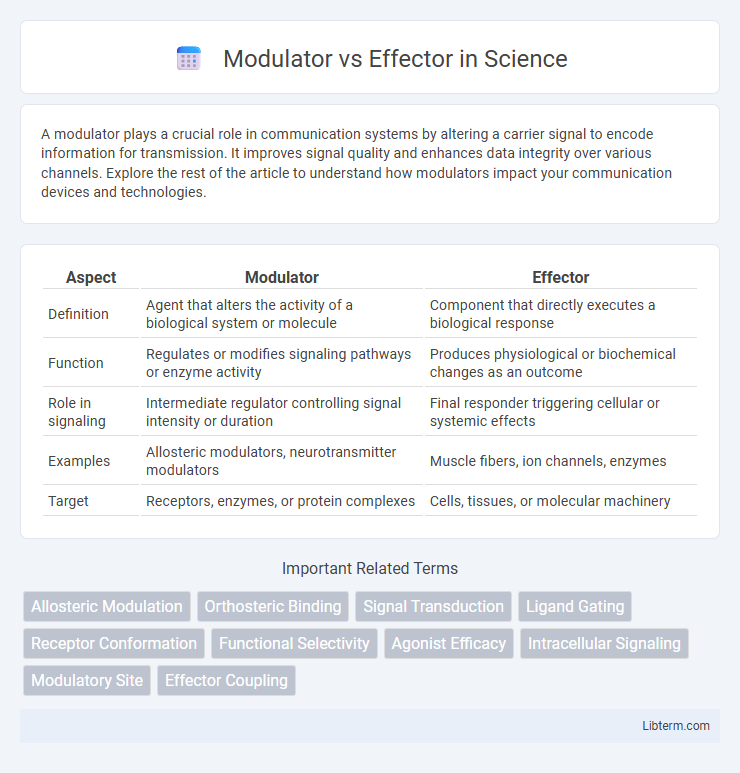A modulator plays a crucial role in communication systems by altering a carrier signal to encode information for transmission. It improves signal quality and enhances data integrity over various channels. Explore the rest of the article to understand how modulators impact your communication devices and technologies.
Table of Comparison
| Aspect | Modulator | Effector |
|---|---|---|
| Definition | Agent that alters the activity of a biological system or molecule | Component that directly executes a biological response |
| Function | Regulates or modifies signaling pathways or enzyme activity | Produces physiological or biochemical changes as an outcome |
| Role in signaling | Intermediate regulator controlling signal intensity or duration | Final responder triggering cellular or systemic effects |
| Examples | Allosteric modulators, neurotransmitter modulators | Muscle fibers, ion channels, enzymes |
| Target | Receptors, enzymes, or protein complexes | Cells, tissues, or molecular machinery |
Understanding Modulators and Effectors
Modulators regulate biological processes by altering the activity or responsiveness of receptors, enzymes, or signaling pathways, enabling precise control over cellular functions. Effectors directly execute physiological responses or signaling events, translating modulator signals into specific biological outcomes. Understanding the interplay between modulators and effectors is crucial for deciphering complex cellular mechanisms and designing targeted therapeutic interventions.
Core Differences Between Modulators and Effectors
Modulators primarily influence the activity, efficiency, or signaling of biological processes by altering receptor or enzyme functions without directly initiating a response, whereas effectors are molecules or proteins that actively trigger specific cellular actions or physiological changes. Modulators fine-tune biological pathways by enhancing or inhibiting signaling cascades, while effectors execute responses such as muscle contraction, secretion, or gene expression alterations. Understanding these core differences clarifies the distinct roles in cellular communication and regulatory mechanisms, emphasizing modulators as regulators and effectors as direct agents of change.
Biological Roles of Modulators
Biological modulators regulate cellular processes by finely tuning signal transduction pathways, often by altering receptor sensitivity or enzyme activity to maintain homeostasis. Unlike effectors that execute specific cellular responses, modulators adjust the intensity and duration of signals, influencing processes such as neurotransmission, immune responses, and metabolic control. Key examples include neurotransmitters like dopamine, hormones such as insulin, and intracellular second messengers, all essential for dynamic physiological regulation and adaptation.
Biological Functions of Effectors
Effectors play a crucial role in biological systems by directly executing responses to stimuli, such as muscle contractions or glandular secretions, to maintain homeostasis. Unlike modulators that regulate signaling pathways, effectors act as the final agents that elicit physiological changes in target cells or organs. Key examples include enzymes that alter biochemical activity and ion channels that modify membrane potential, ensuring precise cellular function.
Mechanisms of Action: Modulators vs Effectors
Modulators influence cellular processes by binding to receptors or enzymes without directly triggering a biological response, often fine-tuning or regulating activity through allosteric changes or inhibition. Effectors, in contrast, initiate a direct biological effect by activating signaling pathways or enzymatic functions, resulting in immediate cellular or physiological responses. Understanding the distinct mechanisms of action between modulators and effectors is crucial for designing targeted therapies and pharmacological interventions.
Examples of Modulators in Cellular Processes
Modulators in cellular processes include molecules such as hormones, neurotransmitters, and ions that adjust cellular activity without directly causing a response, exemplified by cyclic AMP (cAMP) which modulates signal transduction pathways. Protein kinases and phosphatases act as modulators by phosphorylating or dephosphorylating target proteins, thereby regulating enzyme activity and cellular responses. Calcium ions serve as key modulators by influencing processes like muscle contraction and neurotransmitter release through binding to regulatory proteins.
Key Effectors in Biological Systems
Key effectors in biological systems are molecules or structures that directly elicit a physiological response, such as enzymes, ion channels, and motor proteins. Unlike modulators, which influence signaling pathways by altering the activity or availability of other molecules, effectors execute the final action within a cellular process. Understanding these effectors is crucial for manipulating cellular behavior and designing targeted therapeutics in molecular biology and pharmacology.
Modulators and Effectors in Signal Transduction
Modulators in signal transduction regulate the intensity and duration of a signal by interacting with receptors or downstream signaling proteins, often acting as inhibitors or activators. Effectors execute cellular responses by altering biochemical activities, such as enzyme activation or gene expression, following signal reception and propagation. Understanding the distinct roles of modulators and effectors is crucial for manipulating signaling pathways in therapeutic interventions.
Therapeutic Applications: Modulators vs Effectors
Therapeutic applications of modulators involve fine-tuning biological pathways by enhancing or inhibiting protein functions without complete activation or suppression, which can reduce side effects and improve drug specificity. Effectors typically produce more direct and potent responses by fully activating or inhibiting targets, leading to stronger therapeutic outcomes but a higher risk of adverse effects. Drug development leverages modulators in conditions requiring subtle regulatory control, such as allosteric modulators in CNS disorders, while effectors are preferred for acute interventions like enzyme inhibitors in cancer therapy.
Future Perspectives in Modulator and Effector Research
Future perspectives in modulator and effector research emphasize the development of precision-targeted therapies leveraging advanced molecular techniques such as CRISPR and high-throughput screening. Integrating artificial intelligence and machine learning models enhances the identification and optimization of novel modulators and effectors with improved specificity and efficacy. Emerging strategies also focus on dynamic regulation and real-time monitoring of effector activity to enable adaptive therapeutic interventions in complex diseases.
Modulator Infographic

 libterm.com
libterm.com